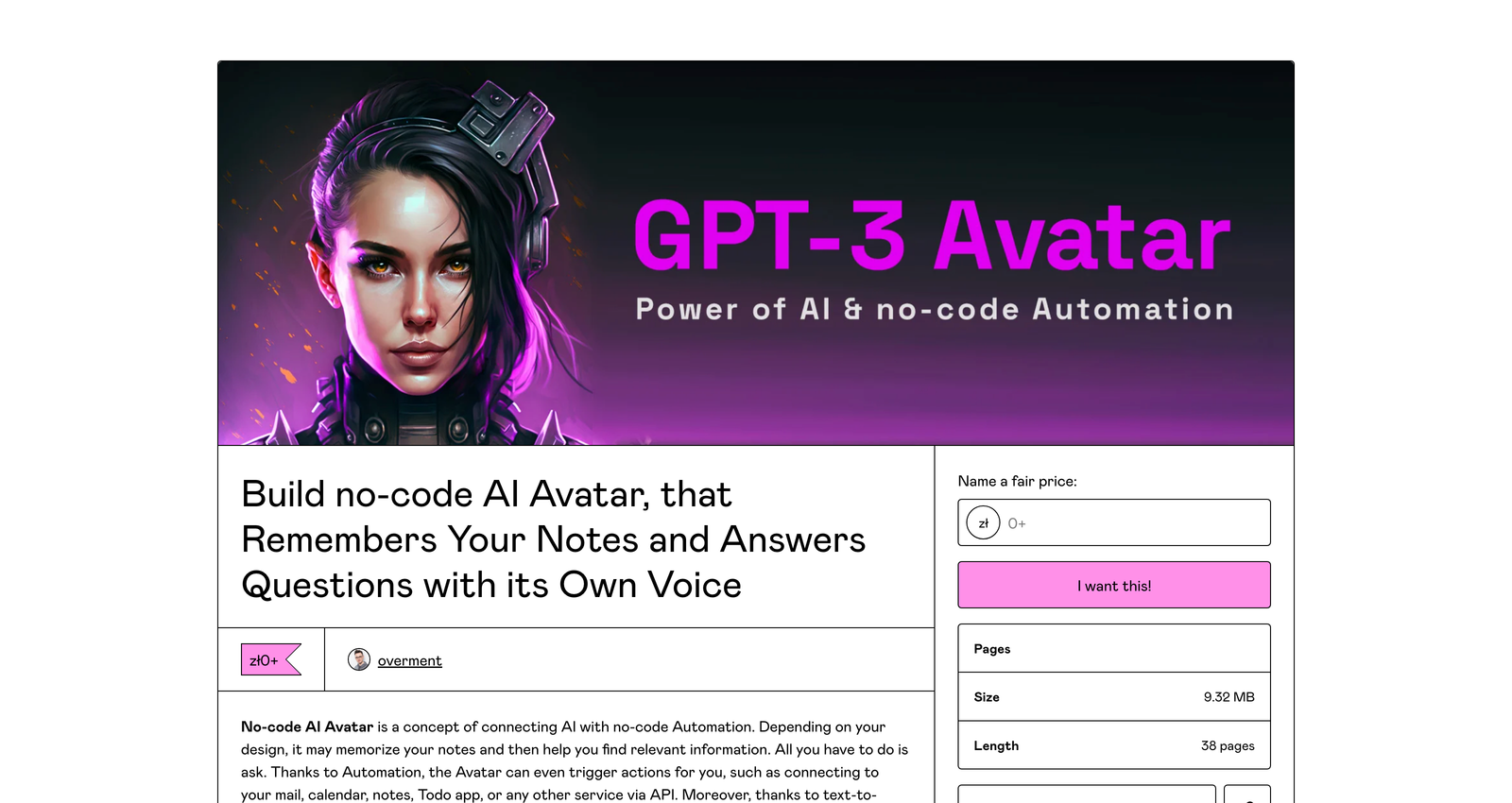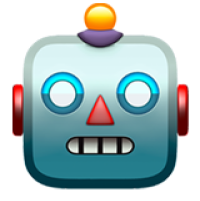All
/
ChatGPT
/
Build no-code AI Avatar, that Remembers Your Notes and Answers Questions with its Own Voice
Build no-code AI Avatar, that Remembers Your Notes and Answers Questions with its Own Voice
No-code AI Avatar is a concept of connecting AI with no-code Automation. Depending on your design, it may memorize your notes and then help you find relevant information. All you have to do is ask. Thanks to Automation, the Avatar can even trigger actions for you, such as connecting to your mail, calendar, notes, Todo app, or any other service via API. Moreover, thanks to text-to-speech services, the Avatar can have its own voice.Instead of explaining what an AI Avatar can do for you, I will demonstrate. But first, let's ask M.O.N.D.A.Y. if there is anything she would like to ask:Cool, hm? An AI Avatar can have both long-term and short-term memory and use them during conversations. As you can see, we're communicating on Slack, but I can also talk to her (literally) using my Apple Watch and Shortcuts, and she responds with her voice. Did you notice that M.O.N.D.A.Y. is aware that Alexa is my dog? Of course, I informed her of this beforehand.And this is what a little demo what your Avatar can do. The exciting part is that conversation is just the beginning. I'll show you more advanced technique, which isn't a topic of this PDF but clearly shows what is possible.Take a look:She can understand what I'm saying (to an extent) and trigger an automation based on what I say. In this case, she added a task to my Second Brain in Notion:She correctly assigned this task to one of my projects (eduweb), gave it a name, priority, and deadline. Even if we don't cover this kind of integration in this PDF, if you have any experience with automation (Airtable, Make, Shortcuts), you may try to create one by yourself.Please keep in mind that this manual is merely an introduction to the topic of AI Avatars. Furthermore, the presented mechanism is not perfect and highly depends on your prompts and the quality of your data. You can experiment with it and make adjustments to suit your needs.Creating your own Avatar will require a few tools (most of them are paid) like Airtable, Make, Pinecone, Shortcuts, ElevenLabs (optionally). The last one is access to OpenAI API, which is also paid service and I highly recommend you to set usage limits right after creating an account, so you won't get surprised. What's inside?After getting this PDF, you'll get a step-by-step manual for creating a core mechanism of an AI Avatar, which includes memorizing, forgetting, and answering based on the information stored in Airtable. At the beginning of the PDF, you'll find a Blueprint for Make.com, so you can go through it more easily.Why it's free?Because it's fun for me and I love to share my knowledge. Of course, I would appreciate it if you could "say thanks" by following me on Twitter, sharing this link with your friends, joining my newsletter, or just having fun, like me! 🦾
Is it Hot product?
Users get decision what is hot, what is not
Hot or Not
Hotness of product
votes
Description
No-code AI Avatar is a concept of connecting AI with no-code Automation. Depending on your design, it may memorize your notes and then help you find relevant information. All you have to do is ask. Thanks to Automation, the Avatar can even trigger actions for you, such as connecting to your mail, calendar, notes, Todo app, or any other service via API. Moreover, thanks to text-to-speech services, the Avatar can have its own voice.Instead of explaining what an AI Avatar can do for you, I will demonstrate. But first, let's ask M.O.N.D.A.Y. if there is anything she would like to ask:Cool, hm? An AI Avatar can have both long-term and short-term memory and use them during conversations. As you can see, we're communicating on Slack, but I can also talk to her (literally) using my Apple Watch and Shortcuts, and she responds with her voice. Did you notice that M.O.N.D.A.Y. is aware that Alexa is my dog? Of course, I informed her of this beforehand.And this is what a little demo what your Avatar can do. The exciting part is that conversation is just the beginning. I'll show you more advanced technique, which isn't a topic of this PDF but clearly shows what is possible.Take a look:She can understand what I'm saying (to an extent) and trigger an automation based on what I say. In this case, she added a task to my Second Brain in Notion:She correctly assigned this task to one of my projects (eduweb), gave it a name, priority, and deadline. Even if we don't cover this kind of integration in this PDF, if you have any experience with automation (Airtable, Make, Shortcuts), you may try to create one by yourself.Please keep in mind that this manual is merely an introduction to the topic of AI Avatars. Furthermore, the presented mechanism is not perfect and highly depends on your prompts and the quality of your data. You can experiment with it and make adjustments to suit your needs.Creating your own Avatar will require a few tools (most of them are paid) like Airtable, Make, Pinecone, Shortcuts, ElevenLabs (optionally). The last one is access to OpenAI API, which is also paid service and I highly recommend you to set usage limits right after creating an account, so you won't get surprised. What's inside?After getting this PDF, you'll get a step-by-step manual for creating a core mechanism of an AI Avatar, which includes memorizing, forgetting, and answering based on the information stored in Airtable. At the beginning of the PDF, you'll find a Blueprint for Make.com, so you can go through it more easily.Why it's free?Because it's fun for me and I love to share my knowledge. Of course, I would appreciate it if you could "say thanks" by following me on Twitter, sharing this link with your friends, joining my newsletter, or just having fun, like me! 🦾
Is it Hot product?
Users get decision what is hot, what is not
Hot or Not
Hotness of product
votes
This AI's Job to be Done
Similar AI Tools
Featured AI Tools
Promote Ai Tool
Submit Product
Showing 0 Free and Premium AI ChatGPT tools
Show All
Share this collection:

